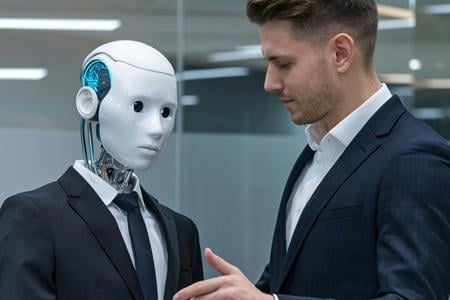While AI is not yet making final hiring decisions, it plays a major role in streamlining recruitment, promotions and employee support systems, says IBM HR professional Lucia Gogová. In this interview, she discusses how artificial intelligence is reshaping human resources – from automating repetitive tasks to supporting strategic decision-making, the evolving skill set required of HR professionals, the importance of ethics, bias mitigation in AI systems, and more.
How has AI changed the recruitment process in companies?
AI is primarily used for back-office tasks, such as generating job requisitions for publication on recruitment platforms. It can create these adverts quickly by drawing on previous examples, which managers can then adapt if needed – a major time-saver. AI is also used in the pre-selection of candidates, taking over tasks that were previously carried out manually. However, our selection process doesn’t mean AI decides who gets hired. It simply makes recommendations. The final decision always lies with the hiring manager. We’re not yet at a stage where AI has the authority to make hiring decisions independently.
You mentioned that AI saves a lot of time. What other benefits has it brought? Were there any surprises?
More information about the Slovak labour market
Please see our Career & Employment Guide.
There’s no single point where we can say that this is where AI made a difference. It’s an ongoing development, and with that, the way HR operates – and the skillset HR professionals need – is also evolving. One major shift is in how we handle repetitive, low-value tasks like extracting data from various systems and compiling spreadsheets. These used to be time-consuming and offered little added value. AI can now handle this instantly, freeing HR professionals to focus on the added-value tasks. Take the promotion cycle, for example.
Our consulting division has criteria for when a person can be promoted to a different salary band, so their performance, skills, how much education they have done, feedback from customers, etc. are pulled from the system. Previously, this data had to be gathered and compiled in a spreadsheet manually. Now, AI pulls all relevant data from our systems, matches it against the criteria, and provides managers with a recommendation. It even drafts the notification email. One click approves the process.
This allows HR professionals to focus on communication – coaching managers on how to have difficult conversations, such as explaining to an employee why they weren’t eligible for promotion, and how to do that in a constructive and motivating way. We’re moving away from administration and towards advisory roles.

Besides coaching, what else has been added to the HR role?
There’s ongoing discussion around what skills people – and especially HR professionals – will need in the future, as AI becomes more embedded in our work. It’s critical to remain a subject-matter expert. AI systems can "hallucinate" (generate plausible but false information – Ed. note) and only someone with deep knowledge can spot these errors.


 Lucia Gogová. (source: Archive of L. G.)
Lucia Gogová. (source: Archive of L. G.)